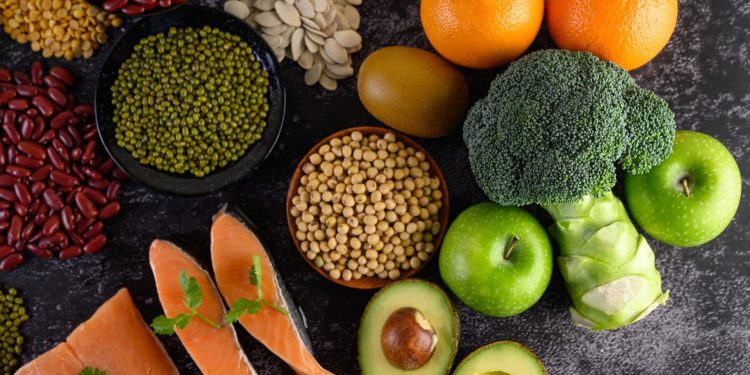Fiber rich food is one of the nutrient-rich and resourceful diets that is often ignored or never given much place to. Well, it is understandable that it is difficult to maintain a healthy, balanced diet in the modern living standards where consuming junk food is the goal of people. People do apply health first rules but on social media to show people. Amidst the need for dietary recommendations, fiber stands out as one nutrient that is essential for nurturing general well-being.
Fiber is more than just a motto, it is essential to a strong, resilient body. A diet high in fiber has numerous advantages, ranging from helping in weight management to supporting digestive health. Fiber rich food is not something totally different from your day-to-day diet. Fiber containing food is easily accessible to people.
Keeping healthy nowadays is becoming underrated until something big happens that makes you feel healthy. No one says to eat broccoli day and night, it is just a game of eating wisely.
You know how sometimes people say that being in good health is equivalent to being wealthy? It’s kind of true, actually. A healthy body, mind, and energy level allows you to enjoy life to the fullest. And you know what? Fiber is a health-promoting superhero.
Therefore, let us enjoy this guide with the purpose of simplifying things. Making your stomach feel nice and maintaining a healthy weight is the goal.
Start the journey now!
What Is Fiber Containing Food?
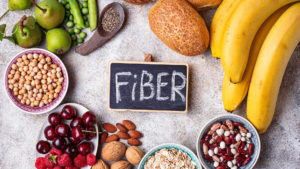
Foods that are high in dietary fiber, a form of plant-based carbohydrate, are referred to as Fiber rich food. Fiber passes through the digestive tract without being absorbed, offering several health advantages. The abundance of fiber improves digestion, helps in blood sugar regulation, promotes heart health, and helps people maintain a healthy weight. Foods high in fiber are nutritional powerhouses that are essential for boosting general well-being and putting health first.
A wide variety of foods are referred to be Fiber rich food because of their high dietary fiber content. Now, dietary fiber is a form of carbohydrate that is derived from plants; however, it is not completely broken down by our digestive enzymes like other carbohydrates are. Rather, it passes through our digestive tract and benefits our health in a multitude of ways.
These nutrients are present in a variety of natural foods, including whole grains like quinoa and oats, legumes like beans and lentils, nuts, and seeds, as well as fruits like apples and berries and veggies like broccoli and carrots. These foods are fiber containing food because they add a substantial amount of fiber to our regular diet.
Fiber functions in our bodies as a helpful assistant when we eat it. Fiber rich food gives our feces more volume, which facilitates passage and supports a healthy digestive tract. Furthermore, fiber can contribute to feelings of fullness and satisfaction, which makes it excellent for people trying to control their weight.
But there’s still more! For people with diabetes or anybody seeking consistent energy throughout the day, fiber is essential in controlling blood sugar levels. Additionally, by assisting in the reduction of cholesterol, it benefits heart health.
Suggested Daily Fiber Intake
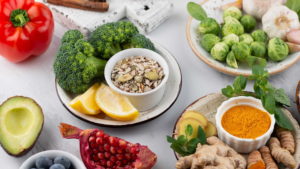
- The Daily dietary fiber intake recommendations say that persons consuming 2,000 calories per day should consume 28 grams of fiber. However, depending on variables like gender and age, this amount might change. There are certain fiber guidelines:
- Under-50 women: 25 to 28 grams daily
- Men under 50: between 31 and 34 grams daily
- Women over 51: 22 grams daily
- Men aged 51 and up: 28 grams daily
Depending on the child’s age and gender, the suggested daily fiber intake for children aged 1 to 18 ranges from 14 to 31 grams. Higher fiber intake has been linked to a possible lower risk of chronic illnesses in several nations.
Fiber is important, but sometimes it doesn’t get the same attention as other minerals, such as calcium and vitamin D. However, it is essential for preserving the goodness of the digestive system with dietary fiber intake recommendations. Achieving the required daily consumption of fiber is not only beneficial for maintaining a healthy digestive tract but also supports healthy weight reduction and gut microbial balance.
An important thing to note is that many people get much less than dietary fiber intake recommendations than what many people should ingest daily. This deficiency leads to several health issues that are often leading to big problems.
Health First: Benefits Of Fiber
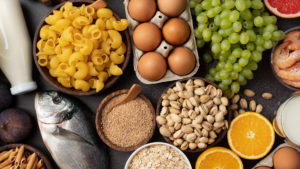
Adding Fiber rich food to your diet has the following advantages:
- Lowering Cholesterol: The fiber in the digestive tract can help reduce the absorption of cholesterol
- Encouraging a Healthy Weight: High-fiber foods, like fruits and vegetables, have fewer calories, therefore, helping in gaining a healthy weight.
- Avoiding Constipation: By giving the digestive tract more volume, fiber helps improve digestion and help avoid constipation. The body stimulates the intestines because it cannot properly digest insoluble fiber.
- Controlling Blood Sugar: The prolonged digestion of foods high in fiber causes the blood to release glucose into the bloodstream more slowly. This contributes to more consistent blood sugar regulation, which is good for general health.
- To avoid any negative effects like gas and bloating, it’s best to introduce Fiber rich food with suggested daily fiber intake into your diet gradually over a few days and to drink enough water
- Heart Health: A lower risk of heart disease has been linked to fiber consumption. It can support overall cardiovascular health by reducing inflammation and blood pressure.
- Better Bowel Regularity: The softness and bulk that fiber offers help in controlling bowel motions, and avoiding constipation and diarrhea.
- Appetite Control: Foods high in fiber require more time to chew and digest which increases satiety and improves appetite control. These effects are super advantageous for health.
- Long-term health first: Eating a fiber containing food is frequently a sign of a well-balanced, nutrient-dense eating pattern, which can improve one’s general health and wellbeing over the long run.
Here Is A List Of Fiber Rich Food
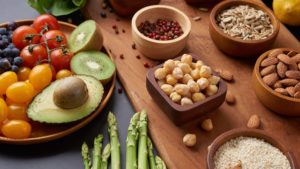
Consuming a range of these high-fiber foods will help you achieve your daily fiber requirements and gain related health advantages. These foods should be consumed in the required potions to avoid too much burden.
- Lentils
- Chickpeas
- Black beans
- Split peas
- Quinoa
- Brown rice
- Oats
- Barley
- Berries
- Raspberries
- Blackberries
- Strawberries
- Blueberries
- Broccoli
- Brussels sprouts
- Spinach
- Carrots
- Sweet potatoes
- Apples (with skin)
- Pears (with skin)
- Bananas
- Oranges
- Almonds
- Chia seeds
- Flaxseeds
- Sunflower seeds
- Pistachios
- Apricots
- Raisins
- Avocado:
- Cabbage:
- Kiwi:
- Cauliflower
- Peas
- Pumpkin
- Barley
- Pomegranate
- Kiwi
- Guava
- Cherries
- Papaya
- Brown Rice
- Pear
- Soybeans
Importance Of Fiber Containing Food
Fiber is an excellent attribute of the health first rule. Fiber is an outstanding thing for the health of your body as it has innumerable properties. It is not wrong to say, your body uses fiber as a powerhouse, and it is essential for preserving good health. Fiber has a great role in your digestive system as it removes superfluous material and facilitates clear, unrestricted passages. Its existence is essential for keeping blockages from hurting and for encouraging a comfortable, functional stomach.
Fiber is a great supporter of weight control along with its digestive advantages. It is a filling, low-calorie substitute that makes you feel full without requiring you to eat a lot of unhealthy foods. It’s an undiscovered weapon in the fight against excess weight.
Moreover, fiber proves its cardiovascular health benefits by actively reducing dangerous cholesterol levels.
Fiber functions as a blood sugar regulator by reducing the rate at which sugar is absorbed, hence preserving steady-state energy levels. Thus, the general metabolic balance is improved.
Not to mention that it protects the body from some malignancies, especially those that affect the digestive system. Fiber strengthens your body’s defenses against possible health risks by acting as a tough shield.
Fiber rich food, suggested daily fiber intake, dietary fiber intake recommendations, health first, fiber containing food
To end it well, which Fiber rich food are you most eager to try, and how will you add more fiber-rich foods to your regular meals?


